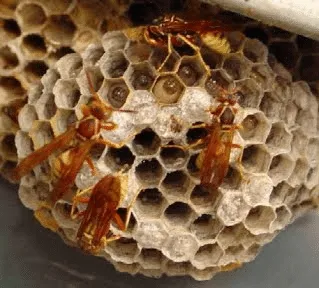There are many different threats that can invade a home. Most are simply an annoyance, but some can actually threaten the well-being of your family. Wasps are aggressive, large, and dangerous, especially to young children, the elderly, and to those that may have a compromised immune system.
It is important to know the difference between a wasp and a common honeybee.
Probably the biggest difference between a bee and a wasp the two is size: wasps are much larger than the average bee. A wasp is thin and elongated. A bee is often plump and a bit furry. They are both black and gold but seen side by side, the two do not look like each other.
The main reason why wasps are so much more dangerous than the common bee is because of their stingers. When a bee stings, they do it as a last resort because the act of stinging actually kills the bee. Wasps however can sting you over and over again and they are considerably more aggressive than the average bee. In swarms, wasps, yellow jackets and hornets can be deadly.
Another distinguishing difference between bees and wasps is the nest. A wasp’s nest is very unique looking. It is usually round like a basketball, but it can also take the shape of the area in which it was built, such as in between a space in a wall. The wasp builds the nest by collecting bits and pieces of debris and when it is finished, it looks like a grey paper ball.
Not every wasp’s nest you see is a threat, though. Wasps will move from one nest to another and leave what appear to be perfectly suitable nests behind. The only way you can tell if a nest is a threat is to view it from a safe, comfortable distance, to see if any wasps are flying in and out of it. If you see traffic around the nest, call the wasp control experts at CAPE Pest Control and have them take care of the issue. Do not try to remove the nest yourself, even if you think you can handle it. Angering a nest full of wasps is a great way to end up in the emergency room.
If you aren’t sure about the flying insects around your home, it is always best to err on the side of caution and contact a CAPE Pest Control expert at 480-800-3777 for more information.

